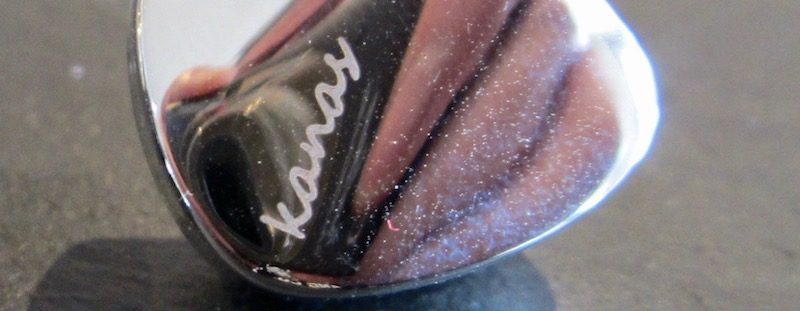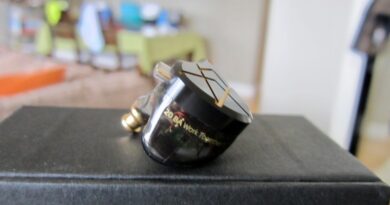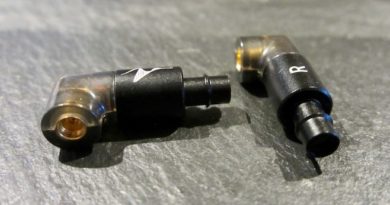Moondrop Kanas Pro Review (3) – Profiles In Chromium

This earphone was reviewed twice on this blog already. You find an alternative review by Biodegraded HERE and another one by Jürgen HERE. For more photos, we offer a dedicated Audio Porn HERE.

Moondrop Kanas Pro–much-reviewed $180 single dynamic has experienced the standard Chifi trajectory of gushing overpraise followed by far more sober reappraisal. My colleagues Jürgen and Biodegraded in particular found these somewhat unbalanced and overemphasized in the bass region, while others (in a Yanny/Laurel scenario) have opined that these are bass-shy. My own impressions are somewhat in the middle—the Pro is neither audiophile-flat nor pronouncedly bassy, but hits the Harman curve—gently U-shaped, with mildly enhanced low end and slightly rolled-off, de-emphasized treble.

Very solidly built and aesthetically impressive; all-chrome shells and considerable heft give these a premium feel. Moondrop may have been better served to use a lighter/glossy alloy—the design is ergonomic, but you become conscious of their weight after an hour or so and the surface is a fingerprint/oxidation magnet. Because of unusually long nozzles, fit is critical (see below); isolation depends on depth of insertion, although these work better outdoors than in the gym or foundry. Note these are unexpectedly inefficient and scale significantly with more powerful sources; bass in particular tightens and deepens and mids push forward with more juice. (For purposes of the below, I used my usual LG V30).

Unsurprisingly, these sound a great deal like the non-pro Kanas, though with dialed-down bass; the tamer lowend on the Pro makes them more transparent and the transition from lows to mids is more seamless. I hear the Pro as slightly warm overall; note texture is full but not forward or artificially energized. Soundstage is fairly oval, with good width and limited depth and height. Stereo separation is really excellent, although imaging and placement tends to be somewhat 2-dimensional, as if the orchestra is all lined up towards the front of the stage.

Initially, using the included large wide-bore silicons and very deep insertion, my visceral reaction was close to Bio’s—the low end, especially the 80-200hz midbass region, was overdone and intrusive, which veiled the mids and gave these an overall incoherence. Switching to narrow bore, smaller tips (and later to bi-flanges) improved matters markedly—midbass quantity lessened and the presentation became more integrated and less congested, albeit less impervious to outside noise. In any event, the Pro is not bass-shy—while lacking the seismic depth and slam of the non-Pro version, quantity is considerable and reasonably sculpted, though not class-leading—decay and speed on certain rock and electronic fare are a tad slow, although acoustic bass is well reproduced.

Mids are largely uncolored, close to front stage and have good body and musicality; guitars and horns are presented very naturally and female voices sound full and clear. Treble, as stated, has limited extension and there’s a slight sweetening at the edges; these lack the microdetail and sparkle of comparably-priced hybrids but also avoid sibilance and stridency and have very good unforced clarity. Much of the time the MKP is like listening to vinyl—natural and free from digital artifacts, although they do not hide the flaws in poor recordings.

Overall, I like the MKP more than my colleagues did—they show a mature, non-fatiguing signature which should appeal to most. Whether these are a significant step-up from current $100 benchmarks is less certain. To my ears, they’re more refined and better-resolving than the IT01 or Pioneer SE-CH9T, which have more drive but less highend accuracy. Compared to the recent Simgot EM2, the MKP are less analytical and present less information, but are beefier and more analogue-sounding; I also find the MKP more engaging than more audiophile-tuned, flatter offerings like the NiceHCK HK6 or Etymotics. However, the cheaper Toneking 9tail and (particularly) the Simgot EN700 Bass do the same basic signature just as capably and are easier to drive. That said, you can also spend a lot more on a mainstream brand and do considerably worse, and they are undeniably pretty shiny things, so don’t feel bad about indulging.

SPECIFICATIONS
Name: Kanas Pro
Type: in ear
Driver: dynamic
Sensitivity: 110 dB
Impendence: 32 ohm
Frequency Response: 20 Hz – 20000 Hz
Cable Length: 1.2m
Plug Type: L-shape
Color: silver
Price: $179.80 (at the time of this review):
Purchase Link:Wooeasy Earphones Store

DISCLAIMER
This pair of Kanas Moodrop Pro was supplied by Wooeasy Earphones Store for THREE independent and critical reviews by the authors of Audio Reviews.
Our generic standard disclaimer






Great job, Loomis, as usual.
Since you’ve mentioned the Toneking 9T, how would you compare them to the KPE in terms of soundstage and clarity ?
TIA!
going from memory, i’d say the 9T’s stage is actually wider and more holographic. if by “clarity” you mean tonal quality/resolution, i’d opine the kpe is more natural-sounding and better, but they’re fairly close.